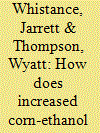|
|
|
Sort Order |
|
|
|
Items / Page
|
|
|
|
|
|
|
| Srl | Item |
| 1 |
ID:
109434


|
|
|
|
|
| Publication |
2011.
|
| Summary/Abstract |
US biofuel policy includes greenhouse gas reduction targets. Regulators do not address the potential that biofuel policy can have indirect impacts on greenhouse gases through its impacts on petroleum product markets, and scientific research only partially addresses this question. We use economic models of US biofuel and agricultural markets and US and world petroleum and petroleum product markets to show that discontinuing biofuel tax credits and ethanol tariff lower biofuel use could lead to increased US petroleum product use, and a reduction in petroleum product use in other parts of the world. The net effect is lower greenhouse gas emissions. Under certain assumptions, we show that biofuel use mandate elimination can have positive or negative impacts on greenhouse gas emissions. The magnitude and the direction of effects depend on how US biofuel trade affects biofuel in other countries with different emissions, context that determines how important use mandates are in the first place, who pays mandate costs, and the price responsiveness of global petroleum supplies and uses. However, our results show that counter-intuitive effects are possible and discourage broad conclusions about the greenhouse gas impacts of removing these elements of US biofuel policy.
|
|
|
|
|
|
|
|
|
|
|
|
|
|
|
|
| 2 |
ID:
094920


|
|
|
|
|
| Publication |
2010.
|
| Summary/Abstract |
In recent years, there has been a push to increase biofuel production in the United States. The biofuel of choice, so far, has been ethanol produced from corn. The effects of increased corn-ethanol production on the consumer prices of food and energy continue to be studied and debated. This study examines, in particular, the effects of increased corn-ethanol production on US natural gas prices. A structural model of the natural gas market is developed and estimated using two stage least squares. A baseline projection for the period 2007-2018 is determined, and two scenarios are simulated. In the first scenario, current biofuel policies including EISA mandates, tariffs, and tax credits are removed. In the second scenario, we hold ethanol production to the level required only for largely obligatory additive use. The results indicate that the increased level of corn-ethanol production occurring as a result of the current US biofuel policies may lead to natural gas prices that are as much as 0.25% higher, on average, than if no biofuel policies were in place. A similar comparison between the baseline and second scenario indicates natural gas prices could be as much as 0.5% higher, on average, for the same period.
|
|
|
|
|
|
|
|
|
|
|
|
|
|
|
|
|
|
|
|
|